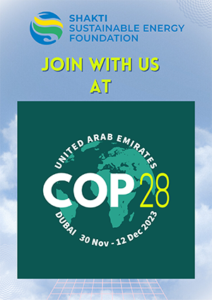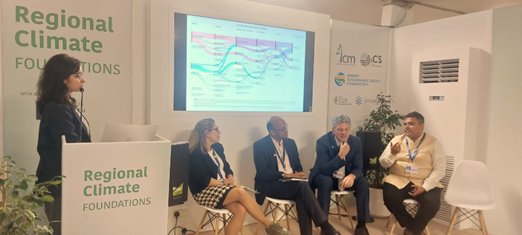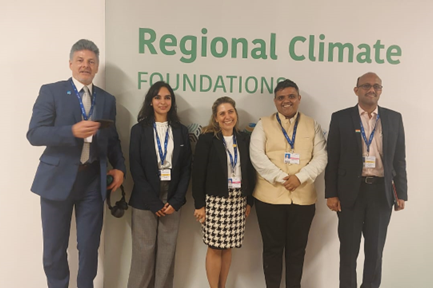
Venue: Regional Climate Foundations Pavillion- COP28 (Pavilion No – TA3-145), Blue zone– B7 and building 88 (Ground floor of building 88, left-hand side)
Date: December 3, 2023
Time: 16:30 to 17:30 GST
To join the event please register below
Register

Objective: This objective of this event is to highlight innovative financing mechanisms and strategies that can catalyse climate-resilient, sustainable agriculture systems in the Global South. By bringing together key stakeholders from diverse backgrounds, the event seeks to facilitate knowledge exchange, partnership building, and the mobilisation of resources to drive transformative change in agricultural and food systems.
Topics to address/ key questions:
- What are the main barriers and challenges hindering investment in climate-resilient, sustainable agriculture?
- Are there specific financial, regulatory, or institutional obstacles that need to be addressed?
- What incentives can be provided to encourage private sector investment in climate-resilient agriculture?
- How can financial instruments be structured to attract investments in sustainable agricultural practices?
- Experience sharing from different Global South countries.

Panellists:
- Mr Swapan Mehra, Chief Executive Officer, IORA Ecological Solutions
- Edel
- Rakesh
- Joana
Detailed Agenda
| Time | Theme/ Activity | Description | Participants |
|---|---|---|---|
| 10 mins | Opening Remarks | Introduction to the session | Vidvatta |
| 20 minutes | Context Setting presentation | Context setting presentation on the landscape of climate finance for agri-food systems globally | CPI |
| 50 mins | Moderated discussion and open-house Q&A | Encouraging partners to share reflections and insights from their work and their specific country experiences on scaling finance for sustainable agriculture and land use.
|
Moderator and panellists |
| 5 mins | Closing remarks | Summary of key messages and invitation to continue the efforts and dialogue. | Koyel Mandal |
Speaker’s bios
Joana Chiavari
Joana Chiavari, is a Research Director at CPI Brazil. She leads the Climate Law and Governance Program and the Climate Finance Program, providing decision makers with in-depth analysis and expertise to strengthen Brazil’s policies and institutions and shape its transition to a more sustainable future, with a strong focus on land use, infrastructure and clean energy. A qualified lawyer in the fields of environmental and climate change law, Joana holds a PhD in Analysis and Governance of Sustainable Development from the University Ca’ Foscari of Venice.
Rakesh Warrier
Mr. Rakesh K. Warrier is Programme Director and Regional Director at BAIF Development Research Foundation. BAIF is a reputed development organisation and research institution working in the domain of sustainable rural development for over 5 decades and has presence across 14 states of India covering 5 million households in more than 100 thousand villages. Mr. Warrier has worked in various thematic and administrative capacities in BAIF. He has been associated with design, development, planning and implementation of diverse and innovative programs in the areas of agriculture, livestock development, appropriate technologies, natural resources management, renewable energy, water, sanitation, rural enterprises, community organisations, value addition etc. He has also been involved in coordination, documentation, review, and monitoring of field programs. Currently, he heads BAIF’s East Region covering four states spread across 76 districts with an outreach of over 0.7 million families. Mr. Warrier is an Engineer by training with an advanced degree in Planning and Development from the Indian Institute of Technology (IIT) Bombay.
Eder Zanetti
Eder Zanetti is a Forest scientist, environmental journalist, member of UNFCCC CDM afforestation and reforestation working group and IPBES business and biodiversity group. He is also the Vice President of global Conservation standart and CSO of Green Farm CO2Free NAC ( natural asset Company)
Swapan Mehra
Swapan Mehra is an environmental finance and climate policy expert with over 16 years of experience in developing climate change mitigation and adaptation projects. He is the Founder-CEO of Iora Ecological Solutions, one of India’s leading environmental advisory firms that enables climate action through integrated nature-based solutions. He is a World Economic Forum’s Young Global Leader (2020), a Donella Meadows Fellow at the Balaton Group, a LEAD India Fellow, and a FICCI Young Business Leader. Swapan has contributed to some of India’s pivotal policy documents including National REDD+ Strategy, NDC Goal 5 Roadmap, and “devolution formula” for India’s 14th and 15th Finance Commissions.
Shakti Sustainable Energy Foundation, in partnership with Iora Ecological Solutions, convened an interesting side-event on ‘Unlocking Financing Opportunities for Climate-Resilient, Sustainable Agriculture in India and the Global South’ during COP28. Engaging participants from Brazil and India, the session fostered insightful discussions delving into best practices for securing finance to propel the widespread adoption of sustainable agriculture. Beyond financing, the dialogue explored mutual learning opportunities between India and Brazil, emphasising the exchange of innovative and collaborative approaches in creating a climate-resilient, sustainable agricultural landscape.


